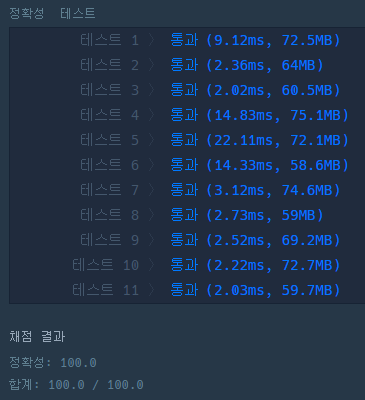| 일 | 월 | 화 | 수 | 목 | 금 | 토 |
|---|---|---|---|---|---|---|
| 1 | 2 | 3 | ||||
| 4 | 5 | 6 | 7 | 8 | 9 | 10 |
| 11 | 12 | 13 | 14 | 15 | 16 | 17 |
| 18 | 19 | 20 | 21 | 22 | 23 | 24 |
| 25 | 26 | 27 | 28 | 29 | 30 | 31 |
- Version
- sourcetree
- homebrew
- Room
- Algorithm
- ViewModel
- Jetpack
- FRAGMENT
- IntelliJ
- Java
- Database
- Kotlin
- github
- androidstudio
- rxjava
- library
- programmers
- leetcode
- Java8
- ReactiveProgramming
- Android
- git
- livedata
- Today
- Total
Learn & Run
[Programmers] 기능 개발 (Java, Kotlin) 본문
https://programmers.co.kr/learn/courses/30/lessons/42586
코딩테스트 연습 - 기능개발
프로그래머스 팀에서는 기능 개선 작업을 수행 중입니다. 각 기능은 진도가 100%일 때 서비스에 반영할 수 있습니다. 또, 각 기능의 개발속도는 모두 다르기 때문에 뒤에 있는 기능이 앞에 있는
programmers.co.kr
문제
프로그래머스 팀에서는 기능 개선 작업을 수행 중입니다. 각 기능은 진도가 100%일 때 서비스에 반영할 수 있습니다.
또, 각 기능의 개발속도는 모두 다르기 때문에 뒤에 있는 기능이 앞에 있는 기능보다 먼저 개발될 수 있고, 이때 뒤에 있는 기능은 앞에 있는 기능이 배포될 때 함께 배포됩니다. 먼저 배포되어야 하는 순서대로 작업의 진도가 적힌 정수 배열 progresses와 각 작업의 개발 속도가 적힌 정수 배열 speeds가 주어질 때 각 배포마다 몇 개의 기능이 배포되는지를 return 해야 합니다.
접근 아이디어
1. N 번째 데이터를 이용하여 term을 구합니다. (term은 제가 정한 변수이며 아래 코드에 포함되어 있습니다)
2. N+1 번째 이후의 데이터를 이용하여 마찬가지로 nextTerm을 구합니다.
3. term과 nextTerm을 비교하여 N 번째가 완료되는 날 완료되는 작업의 개수를 모두 구합니다.
조심해야할 점
term과 nextTerm을 구할 때 올림이 필요한 경우 안필요한 경우를 분기처리하여야 합니다.
- Java
import java.util.*;
public class Solution {
public static void main(String[] args) {
int[] progresses1 = {93, 92, 55};
int[] speeds1 = {2, 2, 5};
int[] progresses2 = {95, 90, 99, 99, 80, 99};
int[] speeds2 = {1, 1, 1, 1, 1, 1};
System.out.println(new Solution().solution(progresses1, speeds1));
}
public int[] solution(int[] progresses, int[] speeds) {
Queue<Work> queue = new LinkedList<>();
for(int i=0; i<progresses.length; i++) {
int progress = progresses[i];
int speed = speeds[i];
queue.add(new Work(progress, speed));
}
ArrayList<Integer> list = new ArrayList<>();
while(!queue.isEmpty()) {
Work work = queue.poll();
int count = 1;
int term = getTerm(work.progress, work.speed);
while(!queue.isEmpty()) {
Work nextWork = queue.peek();
int nextTerm = getTerm(nextWork.progress, nextWork.speed);
if(nextTerm <= term) {
queue.poll();
count++;
} else break;
}
list.add(count);
}
return list.stream().mapToInt(value -> value).toArray();
}
public int getTerm(int progress, int speed) {
if(speed == 1) return 100 - progress;
int term = (100 - progress);
return term % speed != 0 ? term + 1 : term;
}
//작업량과 속도를 저장하는 클래스
static class Work {
int progress;
int speed;
Work(int progress, int speed) {
this.progress = progress;
this.speed = speed;
}
}
}
- Kotlin
import java.util.*;
class Solution {
fun solution(progresses: IntArray, speeds: IntArray): IntArray {
val queue = LinkedList<Work>()
for (index in progresses.indices) {
queue.add(Work(progresses[index], speeds[index]))
}
val list = ArrayList<Int>()
while (!queue.isEmpty()) {
val work = queue.poll()
var count = 1
val term = getTerm(work.progress, work.speed)
while (!queue.isEmpty()) {
val nextWork = queue.peek()
val nextTerm = getTerm(nextWork.progress, nextWork.speed)
if (nextTerm <= term) {
queue.poll()
count++
} else break
}
list.add(count)
}
return list.stream().mapToInt { it }.toArray()
}
fun getTerm(progress: Int, speed: Int): Int {
val term = 100 - progress
return when (speed) {
0 -> term
else -> {
if (term % speed != 0) term / speed + 1
else term / speed
}
}
}
//작업량과 속도를 저장하는 클래스
class Work(
val progress: Int,
val speed: Int
)
}


'Algorithm > Programmers' 카테고리의 다른 글
| [Programmers] 문자열 압축 (Java, Kotlin) (0) | 2021.08.24 |
|---|---|
| [Programmers] 짝지어 제거하기 (Java) (0) | 2021.08.23 |
| [Programmers] 거리두기 확인하기 (Java, Kotlin) (1) | 2021.08.16 |
| [Programmers] 2개 이하로 다른 비트 (Java, Kotlin) (0) | 2021.08.15 |
| [Programmers] 순위 검색 (Java, Kotlin) (0) | 2021.08.15 |




